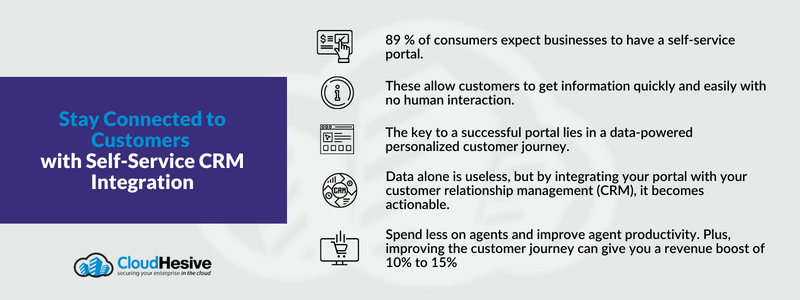
The definition of superior customer service keeps changing. In an era of hyper personalization in customer interactions, the more information you have regarding your website visitors, the better. This requires the collection and analysis of data, and there’s no better place to get the data you need than your self-service portal. This data, once integrated into your CRM, can help forge loyal customer relationships.
Consumers, by a large margin – 64%– say they want brands to connect with them. And in the modern digital age, 89% of them expect companies to have a self-service portal, and 79% say they have used them. That’s a large percentage of a huge number: 263 million Americans shop online. That’s a lot of data at your disposal.
The data collected in your self-service portal is incredibly valuable, but to leverage its full potential, it must be integrated into your CRM. This integration provides broad benefits for your company, your customers, and your support teams. Let’s look at why you should have a self-service portal and what its many advantages are.
The importance of a self-service portal
On a small scale, self-service options have always existed. Self-service portals are features on a website that allow users to resolve issues on their own. A simple form of this is an FAQ or a link to an owners’ manual. But then everything changed.
Self-service portals turned into a necessity during the pandemic, when low-touch options became imperative. And customers love them. Companies learned that they could increase customer satisfaction and retention while decreasing live-agent interactions. Customers get the answers they want quickly and easily without having to wait on hold for an agent, engage in a live chat, or send an email that may take days to answer.
The level of customer service you offer also affects your bottom line:
- Companies that prioritize the customer experience realize between 4% and 8% more revenue
- Higher retention rates can increase profits from 25% to 95%
- Improving the customer journey can see revenue increases of 10% to 15%.
- About 86% of customers say they will pay more for a great customer experience
Increased customer satisfaction also improves the employee experience. Businesses that deliver an excellent customer experience have one and a half times more engaged employees than those who deliver a poor or indifferent experience.
Your self-service portal has taken over as your first line of customer support, enabling users to find information, request services, and resolve problems quickly and easily. They also provide a rich source of data that helps you connect with your customers. Let’s look at some of the positive impacts.
Self-service – beloved by customers and agents, plus bottom-line benefits
Customer self-service portals not only please customers. Their benefits ripple through a company. The customer knowledge gained through data can improve customer relationships, help you reach new customers, and be the key to a healthy revenue boost. Here are some of the benefits of your self-service portal:
- Reduced customer service costs. With the ability to find answers on their own, customers need a reduced amount of support from a live agent. And self-service is infinitely scalable, so you won’t have to invest as much in customer service agents as you grow.
- Improved agent productivity. Fewer calls mean agents can spend more time with customers who don’t use self-service. Increased productivity is one bonus, and agents can give high-touch customers more of their time.
- Boosted site traffic. A robust self-service portal engenders trust, boosts brand visibility, and positions your company as an authority.
A self-service portal also gives you the opportunity to offer a completely personalized experience, allowing customers to be addressed by name and see customized product recommendations. Personalization makes your customers feel that you know them and understand their issues. You can form a deeper connection, but you need actionable data from your CRM.
Forging connections takes CRM integration
The ability to offer stellar customer service in a self-service portal rests within your CRM. By connecting the two, you’ll be able to track the behavior and actions of the visitors to your portal. This not only personalizes the experience in your portal but will also inform your marketing efforts. Here’s how:
Obtain detailed, actionable analytics
You have a lot of customer data coming in, and that’s great. It’s one thing to have data, but for it to be usable, you have to know what it means and how to use it.
Your CRM has analytics capabilities built in that contextualize data, digesting it and turning it into actionable items and valuable, easily understood metrics. You’ll know what your customers were looking at in your portal, whether they found what they needed, and what they did with that information – such as make a purchase or take advantage of an upsell – or if they left quickly because they didn’t find what they needed.
Provide a seamless, connected experience
Your CRM provides a central database with all the information you have on your customers. Connecting it to your self-service portal only makes sense. Self-service portals are great, but what if a customer needs more help? A cohesive, consistent experience is key, no matter how customers connect.
With integration, data is available on a single screen that provides the essential information an agent needs to pick up where the customer last left off. This means a seamless experience that doesn’t require customers to repeat information.
Get a complete view of your customers
Connecting your self-service portal with your CRM gives support teams a 360-degree view of customers across all their interactions, no matter which channel they use. This means you can create a consistent experience no matter how the customer communicates and lets you nurture loyalty throughout the sales funnel.
Detect patterns and trends for continuous improvement
Data from your self-service portal can reveal patterns in requests for certain information or products. This can inform your total business strategy by providing firsthand feedback that can result in new products and enhanced service offerings.
Self-service portals are the first choice for today’s consumers. With the detailed actionable data from your CRM, it can become a customer service powerhouse that provides the best in a seamless, consistent journey. And the best customer journeys create loyal customers who are eager to open their wallets.
Build a better self-service portal with CloudHesive
Make the most of your valuable business intelligence. Give your customers what they want, and you’ll get loyalty in return.
CloudHesive is a cloud solutions consultant and managed service provider. We’ve helped more than 100 companies reduce their operating costs and increase productivity with our focus on security, reliability, availability, and scalability. With over 30 years of experience, we leverage cloud-based technology to its full potential. Contact the CloudHesive team today.



